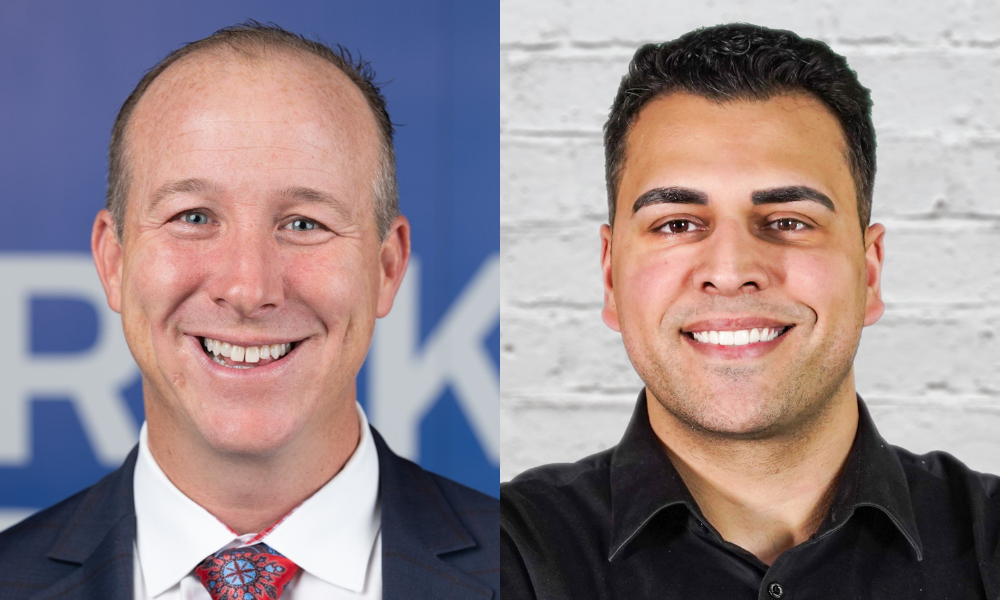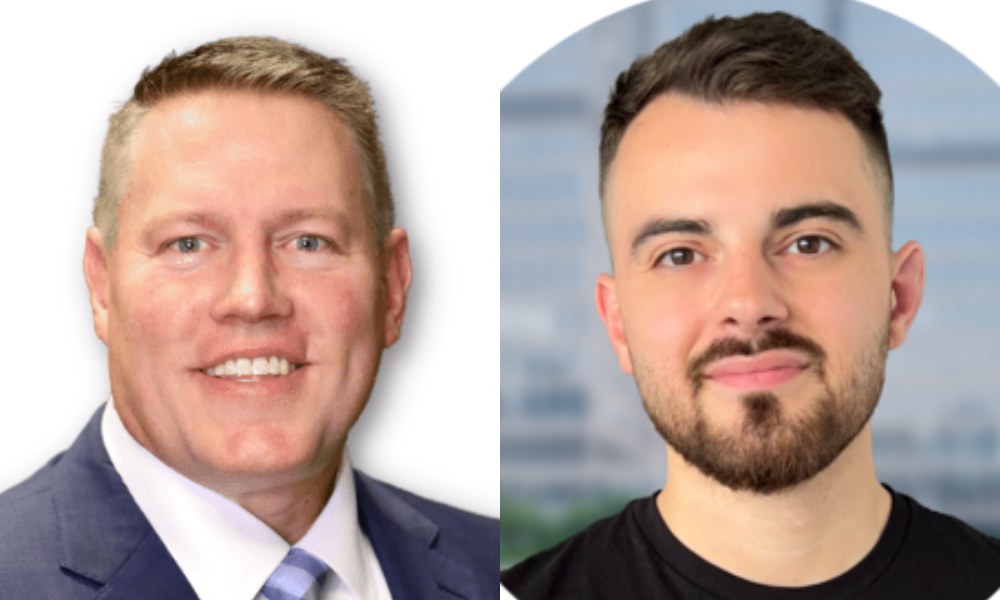From seasoned to upstarts, pros give tips on excelling amid uncertainty

Short of maybe morticians and barbers, most businesses aren’t immune to economic downshifts. Yet mortgage industry officials recently gathered to discuss how brokerages can recession-proof their businesses.
The talk took place during the recent Hall of AIME conference from Jan. 26-28 in Naples, Fla., designed to showcase top producers. Moderated by Tom Ahles (pictured top left), president of growth at AIME, a panel featured Jonathon Haddad (pictured top right), president of Next Door Lending; Trevor Barrett (pictured below left), broker and president of Barrett Financial Group; and Russell Petty (pictured below right), senior mortgage planner and broker-owner at Grow Mortgage.
For some, the term “recession” appears to be relative even though there are various criteria that define the economic cycle. Many point to robust job growth – even amid inflation – as evidence that a recession has yet to emerge given that measure’s viability. Still, some on the panel spoke as if a full-fledged recession, rather than inflation, had already struck.
Focused on the positive

Petty employed a bit of self-deprecating humor in describing the timing of his brokerage’s opening: “April last year – what a time to open a brokerage company, right?” he told the crowd gathered to hear the panelists.
Instead of focusing on the negative aspects – the specter of inflation, the volatility of interest rates – he focused on the positives. His transfer from retail yielded additional insight into what tactics to take in the uncertain economic climate, he suggested: “Recessions are tough for us, but they’re really, really tough for retail as well,” he said. “So it’s a great time to pick up market share. It’s a great time to look at the positive of things. We kept very, very lean. It was a benefit we opened in a recession because we thought we needed to really be careful. It can only get better from here —that was the thought process. You’ve got to keep positive and double down. If you truly believe in that plan, it’s going to work as long as you stick with it.”
Focused on expansion
Formerly at Rocket Companies, Haddad is keen on growth. But he didn’t sugarcoat it: Being in growth mode is not easy, and not for the faint of heart. “It’s hard,” he said. “It’s very, very hard. It’s very difficult.”
But with that bit of balloon-popping out of the way, he grew philosophical in describing the mentality that is needed to grow in the current climate. “It’s very important to believe in yourself, but it’s just as important to not lie to yourself,” he said. “And that’s been a big part of our growing.”
It all begins with deep introspection in digging for fundamental truths: “How good are we really? What can we actually take on?” he said in conveying questions he asked himself while in the throes of launching his firm. “Whenever you’re building a process, it’s very important to work backwards no matter how hard that might be. Sometimes, it’s difficult for people to see the vision. They might see ‘A’, ‘B’ and ‘C’, but maybe not ‘Z’. You have to find it. I don’t care how difficult it is, whenever you want to scale or build your business, you have to sit down with those you trust the most and work backwards.
And then come more questions: “You want 100 people? What is it going to take to have 100 people – mentally, emotionally and physically? Because this is very difficult. Ask yourself what are you willing to do to structure and set yourself up for the future, and are you willing to commit and execute? Because I don’t think a lot of people want to execute.”
Focused on team building
For Barrett, recession is no abstraction after having survived the Great Recession of 2008. Ahles was candid of his own experience, telling audience members how his firm went under during the episode before he was able to re-emerge – prompting him to ask the audience for a round of applause for Barrett’s business survival and current success with some 1,000 team members.
The key to his success, Barrett suggested, was that he was debt-free during the Great Recession, which left him to focus on growth. As a result of that past experience, he said something that may have sounded counter-intuitive to others: “I love this time,” he said. “This is the best time ever.”
Why? Because he made a killing in the Great Recession sans of debt and gaining market shares while others dropped off around him.
“I’ve seen rates go up and down, up and down,” he said. “I’ve been through these downturns and upturns. In 2005, a mentor said to me ‘stay out of debt.’ That was a key element of getting through that recession in 2008. I made more money than I ever did.”
He described what he experienced as a frenetic game of musical chairs: “I had the last chair,” he recalled. “I was the last person standing. I told myself that I could make a lot of money, and I did. I saw it coming. When rates were in the 2s and 3s the last few years, I knew rates were going to go up – everyone knew that. But I stayed out of debt, and I started to build. If you don’t build for recession time, you’re in trouble.”
Flash forward to the present, and he described the current focus: “Last year, I said to my team that we’re going to get all the best loan officers in the country,” he said. “We’re going to try to get them from retail. We don’t take everyone – we take the best of the best.”


